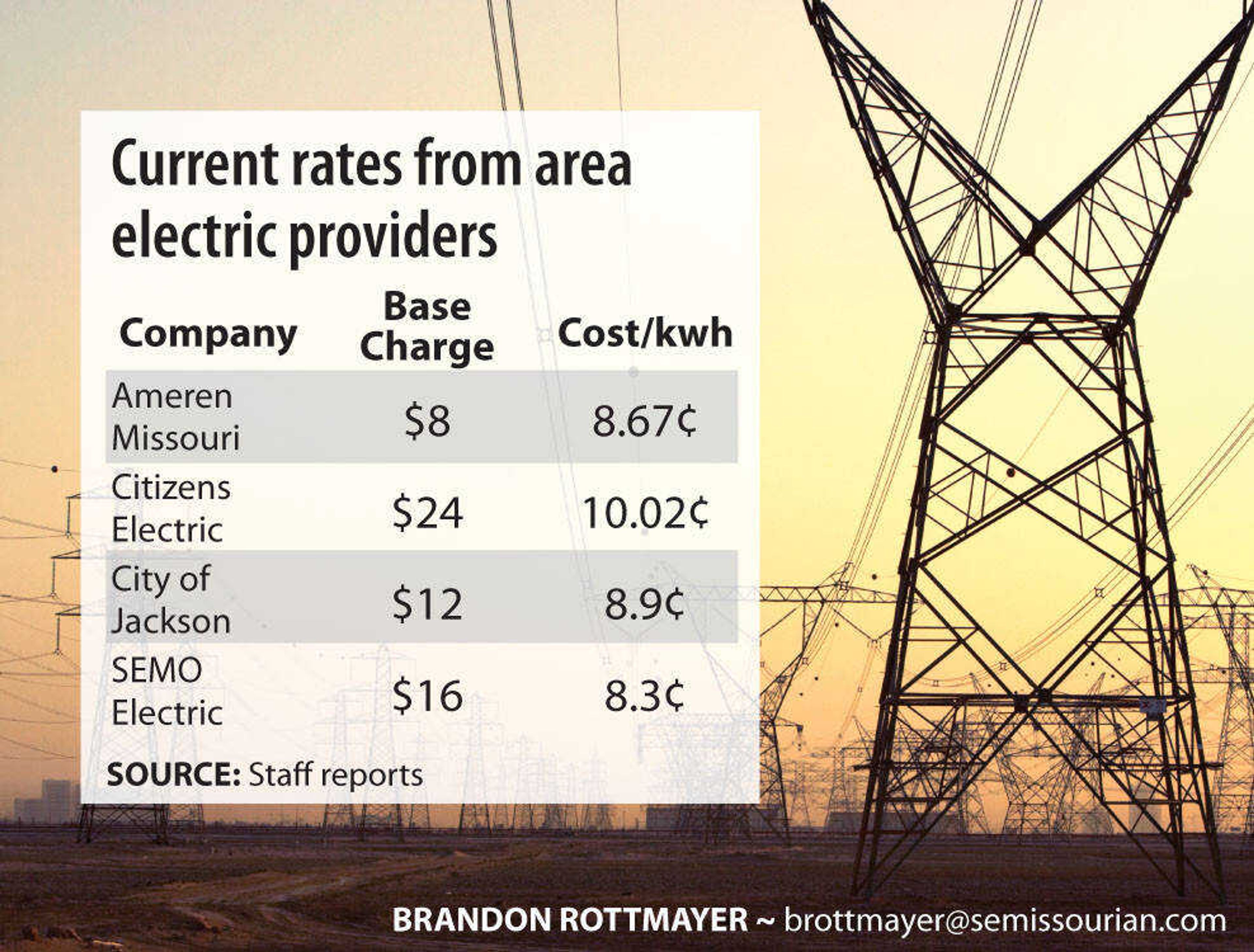Rate increase would be Ameren's fifth in six years
Luther Haynes has tried and tried to lower his electric bill. He installed a new energy-efficient furnace for his Cape Girardeau home. He switched to compact fluorescent light bulbs. He unplugged everything that he wasn't using. Instead of lowering his bill, he's watched it continue to increase...
Luther Haynes has tried and tried to lower his electric bill. He installed a new energy-efficient furnace for his Cape Girardeau home. He switched to compact fluorescent light bulbs. He unplugged everything that he wasn't using.
Instead of lowering his bill, he's watched it continue to increase.
Every month, since 2008, he updates a spreadsheet tracking his energy usage and Ameren Missouri rates per kilowatt-hour. He's watched his usage go down, while his total bill kept going up.
When he heard of the investor-owned utility's latest proposal to increase rates by 14 percent, he was enraged.
If Ameren's $376 million rate request is approved by the Missouri Public Service Commission, it will be the fifth increase in six years.
"I say that it's time for the Ameren Missouri company to have a wage freeze from the upper management to the CEO," Haynes said.
Haynes isn't alone. Over the past few years, scores of customers have expressed their ire at Ameren's frequent requests for rate increases.
The PSC has granted Ameren the following base rate increases since 2007:
August 2007: $42,788,000
March 2009: $161,709,000
June 2010: $229,600,000
August 2011: $173,225,000
Ameren contends the latest rate increase is needed to cover higher fuel costs, infrastructure improvements to help prevent power outages, higher costs for energy-efficiency programs, and increasing costs to meet renewable energy requirements and provide employee benefits, according to its website.
The Public Service Commission has 11 months to review Ameren's request and will hold public hearings in July and August around the state, said Kevin Kelly, spokesman for the PSC, which regulates investor-owned utilities in Missouri.
Among those companies, Ameren has the lowest residential cost per kilowatt-hour, according to PSC data.
Ameren's current rate is 8.67 cents per kilowatt-hour but would go up to 9.94 cents if its proposed rate increase is approved. Other investor-owned utility rates include Empire District Electric Co., based in Joplin, Mo., at 10.57 cents per kilowatt-hour and Kansas City Power & Light, at 10.04 cents.
Ameren is near the bottom among Southeast Missouri utility companies when it comes to rates as well.
SEMO Electric Cooperative, based in Sikeston, Mo., charges less than Ameren, with a rate of 8.3 cents per kilowatt-hour. The city of Jackson's rate is slightly higher than Ameren, at 8.9 cents per kilowatt-hour. Citizens Electric Corporation, based in Ste. Genevieve, Mo., is the highest in the region with a rate of 10.02 per kilowatt-hour.
Citizens Electric is preparing to raise rates in May by one-third of a cent per kilowatt-hour. Its base charge will also go up $1 per month. The company's last rate increase was in May 2010.
Rates for electric cooperatives, like Citizens Electric and SEMO Electric, aren't regulated by the Missouri Public Service Commission. They are set by the cooperative's board of directors, who are elected at its annual shareholder meeting.
"Since power supply is our greatest cost, projected generation costs for the next year are the driving force when establishing rates," said Barb Casper, spokeswoman for Citizens Electric.
About 80 percent of every dollar her company spends goes toward purchasing power, she said.
Citizens gets its power from Wabash Valley Power Association, a not-for-profit generation and transmission cooperative based in Indianapolis, Ind. Wabash Valley Power Association provides power to 27 cooperatives in Missouri, Indiana, Illinois and Ohio.
Jackson is one of few utilities that has lowered its rates in recent years, according to Don Schuette, director of electric utilities for the city.
While the city-owned utility can produce its own electricity, for the past several years it has been buying power through the Missouri Public Energy Pool, a coalition of more than 30 cities that contracts to purchase bulk electricity.
"Right now you can buy it cheaper than we can produce it, so the wise thing to do then is buy the power," Schuette said.
Following a cost-of-service analysis in 2010, the Jackson Board of Aldermen restructured its electric rates -- switching from three rates based on usage ranging from 13.4 to 9.4 cents per kilowatt-hour to a flat rate of 8.9 cents. The lower rate took effect in February 2011 and did not change for 2012.
As a whole, Missouri was ranked 14th based on average residential electric rates, according to the U.S. Energy Information Administration in 2010. The state's average rate was 9.11 cents per kilowatt-hour.
Environmental regulations to reduce air pollution, upgrades to aging infrastructure and increasing fuel costs are all making electricity more costly to produce.
While electric customers are paying more, natural gas customers have seen significant savings over the last several months.
Natural gas futures have dropped 44.8 percent in the past year, according to the New York Mercantile commodities exchange. Both residents who use natural gas for heating and cooking and manufacturers of plastics and chemicals have benefited from lower gas prices as a result of new drilling techniques allowing companies to tap supplies they were previously unable to access.
mmiller@semissourian.com
388-3646
Pertinent address:
Jackson, MO
Cape Girardeau, MO
Sikeston, MO
Ste. Genevieve, MO
Connect with the Southeast Missourian Newsroom:
For corrections to this story or other insights for the editor, click here. To submit a letter to the editor, click here. To learn about the Southeast Missourian’s AI Policy, click here.











